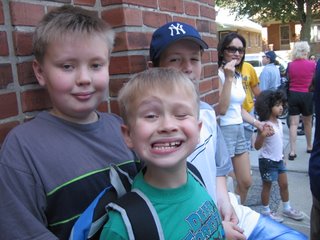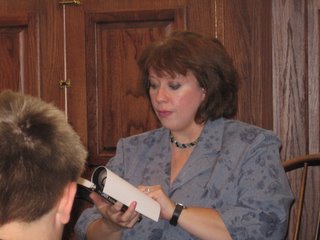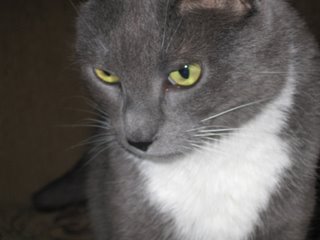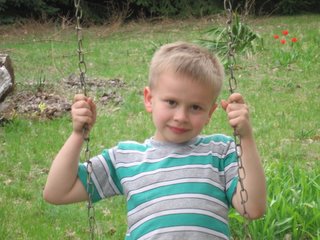
This is an essay I wrote a couple of months ago about the chaos of teaching English for living. Now, from the calm of summer vacation, I can appreciate it even more, although it seems horrifying by comparison to my current quiet days . . . .
Breakfast is chaotic. My children are watching Spongebob and not paying attention to the clock; then there is much yelling as they try to find homework, lunches, jackets, and somehow I am to blame. This is nothing new, so I don’t bother to protest the injustice. We run to the car, I with my bag and lunch, they with theirs. On the way my little one decides that he doesn’t like school and starts to cry. I reach awkwardly into the back seat to pat his leg, my eyes on the clock. If we are late, I will be blamed again. Parents, I find, are blamed for everything. At school we find the appropriate lines, say our goodbyes; I dab at my son’s eyes and tell him everything will be fine. He marches bravely in, his face as grave as a soldier’s.
So I feel guilty as I drive to another school, the school where I work. I rush in to check my mailbox and my voicemail, not to be confused with my e-mail, which I will check upstairs on my computer. Maybe someday there will be mindmails. Clutching my pile of correspondence, I stand in line at the copier with my handouts for the day. Two faculty members are ahead of me; obviously their children didn’t watch Spongebob. When I get to the front, my precious quizzes and worksheets in hand, the machine mocks me with its flashing message: “Needs toner.” This is the copy machine’s way of saying “Ha, Ha!” It turns out there is no toner; the copy machine, alas, will be unavailable for a time.
Copyless, I trudge upstairs to face Period One. They are primed and ready for the vocabulary quiz. I explain, after we pray and say the Pledge of Allegiance (with varying degrees of patriotism) that I do not have the quiz copied. “But I studied all night!” yells one indignant vocabularian. Teachers, I find, are always blamed. “Sorry,” I say. “It’s not like you’ll forget the words now that you know them.” The class disagrees, loudly and at some length. I glance at the clock. I need to transition into a grammar lesson and then into a bit of background on the roaring twenties before we launch into a discussion of last night’s chapter of The Great Gatsby. Time is always of the essence, even when there are ninety minutes. Trying to brighten the atmosphere, I paste on a smile and say, “Who can explain the term ‘irregular verb?’” This is met by a stony silence. Students apparently hate verbs, perhaps more than any other part of speech.
Gatsby doesn’t fare much better. Nick Carraway is less popular than a verb today;
F. Scott Fitzgerald will not be recommended to friends as fun spring break reading. I have somehow failed to convey the majesty of grammar and good literature. When the bell rings they rush out, some smiling sympathetically. I wouldn’t want your job, their faces say.
In homeroom I take attendance, then pass things out and collect other things, all the while making a “ssssshhhhhh” sound so that students will be quiet during announcements. I sound like a leaky furnace, and I receive about the same respect.
In Period Two I hand a detention to a girl with a large nose stud. “What’s this?” she asks. “It’s a detention,” I say. “For your nose jewelry.” She glares at me. While all the students know the rules, not one cares to be reminded of them. In fact, this is another thing which has become my fault. “That’s not fair,” she says. She seems to believe this, even as the large faux diamond in her nose glints in the fluorescent light. Her friends glare at me, as well. I have committed a dreadful crime. I feel suddenly tired.
In Period Four I write several isms on the board: Naturalism, Darwinism, Socialism, Nihilism. I hear sighs. Students hate isms. Still, for a time we have a lively discussion. Then students are asked to write a response to something on the board. “Write?” one of them asks. “Why?”
It might surprise people to know that despite the fact that this is an English class, I get this question all the time, as well as the “Why must we read?” query. I’m not sure exactly how students, given their druthers, would go about studying language, but apparently I haven’t hit on it quite yet. Surveys, however, don’t always help me to answer this dilemma, as they elicit responses like “Try to be less boring.”
After school I race to the grade school where my children are waiting. I have broken several laws to try to get there on time, to avoid that inevitable blame. I fail. “You’re late,” my sons tell me, piling in the car. “We were the last ones here.” They are surly in the back seat, punishing me with their silence.
“Sorry,” I say. I drive home. There the dog and cat blame me for my absence in their own ways; I must walk the dog, even though I sense he has not waited, but left his blame in a concrete form on the basement floor.
I sit with the boys as they do their homework. I try to do some of my own; there is a huge pile of essays and journals that I must grade, but I am interrupted almost every minute. Concentration is something I once achieved, in a quieter past. By the time they are finished (and I have made hardly a dent) I must clear the table and scrounge around for something resembling dinner. I am rarely enthused about this process; I have my own homework waiting for me, tons and tons of scholarly reading, as well as an assignment from my writing group. I have a meeting this evening, so nothing will get done, which means that tomorrow I must face the eager faces asking if I graded essays and say, “Sorry.”
“I need field trip money,” one son tells me, as the other digs through his father’s shirts for an art smock. I am distracted from dinner. When I finally provide it, it is not impressive. My husband comes home and peers into the lonely pot on the stove. “Hot dogs?” he asks, disappointment carving itself into his features.
“Sorry,” I say. Wives, I find, are always blamed.











